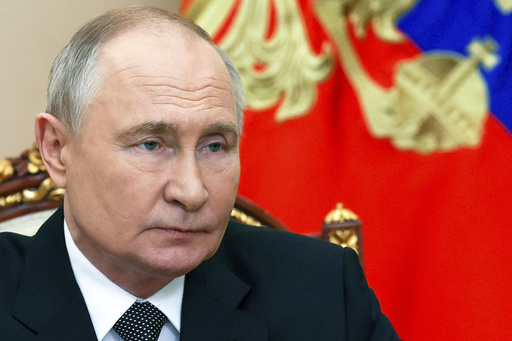
In the wake of the recent presidential election, a somewhat smooth process brought a sigh of relief to those dedicated to fostering public confidence in the electoral system. However, the prevalence of misinformation aimed at shaking trust in voting, along with attempts to create disorder, remains a significant concern that experts predict will escalate in the future.
The most notable challenge faced by election officials on Election Day was a series of bomb threats that emerged in five key battleground states, leading to temporary evacuations of some polling locations. Despite this, the election unfolded in a manner similar to previous years, with only typical complications, and former President Donald Trump’s substantial lead enabled the race to be declared early on Wednesday morning.
“High voter turnout and significant margins – that’s the goal we always strive for,” noted Zach Manifold, from the elections office in Gwinnett County, Georgia.
With over 84 million individuals having cast their ballots early, whether in person or through mail, the pressure on Election Day was alleviated. This early participation granted election workers greater adaptability in addressing unplanned obstacles.
“The events of yesterday, as well as the entire election season, highlighted the crucial role of early voting in ensuring security and mitigating some threats,” remarked David Becker, an ex-U.S. Justice Department attorney who currently heads the Center for Election Innovation and Research.
When bomb threats were reported — beginning in the Atlanta area and extending to states like Arizona, Michigan, Pennsylvania, and Wisconsin — election officials were ready. Throughout the year, they had engaged with local law enforcement, participated in various training scenarios, and updated emergency procedures.
“I witnessed professionals nationwide declaring, ‘Here’s our action plan,’” stated Carolina Lopez, who previously served as a local election official and now leads the Partnership for Large Election Jurisdictions.
The FBI indicated that the threats seemed to have originated from Russian email domains; however, cybersecurity officials warned against making assumptions about the perpetrators’ identity.
The concern regarding interference from nations like Russia, Iran, and China was a consistent topic during the election season. These countries notably increased their use of English-language misinformation in the lead-up to the election. Their strategies involved deploying networks of fake social media accounts and websites to disseminate content designed to erode faith in election security and American democracy.
Russia, in particular, was bold in its tactics, including the production and distribution of staged videos intended to cast Vice President Kamala Harris and her running mate, Minnesota Governor Tim Walz, in a negative light. Moreover, the Kremlin’s efforts this year included a partnership with a Tennessee media firm to produce pro-Russian material, costing $10 million.
“There’s no doubt that Russia interfered in this election,” asserted Brian Taylor, a political science professor and expert on Russia at Syracuse University. He emphasized that while no evidence suggests these activities influenced the election’s outcome, Russia’s aim was to “assist Trump while instigating more chaos overall.”
Analysts believe that America’s adversaries are pursuing a long-term strategy focused on undermining public trust in their own nation and gradually weakening U.S. power. Russia has shown a preference for Trump as a candidate, viewing him as less likely to offer support to Ukraine, highlighted Emerson Brooking, a senior fellow at the Atlantic Council’s Digital Forensic Research Lab.
“This issue doesn’t vanish post-election,” Brooking emphasized. “What are Russia’s true objectives? Their goal wasn’t strictly to elect President Trump, but to guide the U.S. in a distinct direction, and Trump’s election is merely one phase of that journey.”
Countries like Russia, Iran, and China have denied any involvement in attempting to interfere with the American electoral process.
Steve Simon, the president of the National Association of Secretaries of State, lauded quick actions taken by federal agencies in responding to misinformation. He highlighted that federal officials quickly identified Russia as the source of a viral video falsely alleging voter fraud in Georgia.
“The efficacy and speed of their response significantly curtailed the reach of those misleading messages,” Simon, who is also Minnesota’s chief election official, added.
Kim Wyman, a former official from the U.S. Cybersecurity and Infrastructure Security Agency, pointed out that this election showcased the real impact of foreign actors attempting to interfere in U.S. elections. “Foreign adversaries have not ceased their efforts to influence elections in the U.S., and we expect this trend to persist,” she stated.
Wyman expressed her hopes that the Republican majority in Congress would continue to back the Cybersecurity and Infrastructure Security Agency and the U.S. Election Assistance Commission to enhance election processes and certify voting systems.
Advocates for voting rights expressed optimism that the absence of major issues during the election would temper discussions around implementing sweeping changes to voting methods. Throughout the campaign, Trump and his supporters had called for a single day of voting while promoting unfounded claims of extensive voter fraud tied to mail-in ballots. It remains uncertain whether this rhetoric will persist, particularly as Republicans embraced early voting this year following Trump’s encouragement.
Continuing to spread falsehoods regarding his election loss in 2020, the president-elect raised questions about voting methods and accused Democrats of cheating; however, he ceased these accusations once he gained the lead.
“I remain hopeful that we’ll maintain the systems that work effectively for the majority of voters,” said Jay Young, senior director of voting and democracy with Common Cause. However, he expressed concern over any attempts to restrict voting based on unfounded claims, similar to the narratives pushed by Republicans asserting that large numbers of non-citizens were participating in elections. This has been a legislative focus among Republicans in Congress.
“Much of the rhetoric present these days is not grounded in reality,” Young stated. “It is my responsibility, alongside my allies, to ensure that we do not allow anyone to capitalize on a moment to push a specific political agenda.
